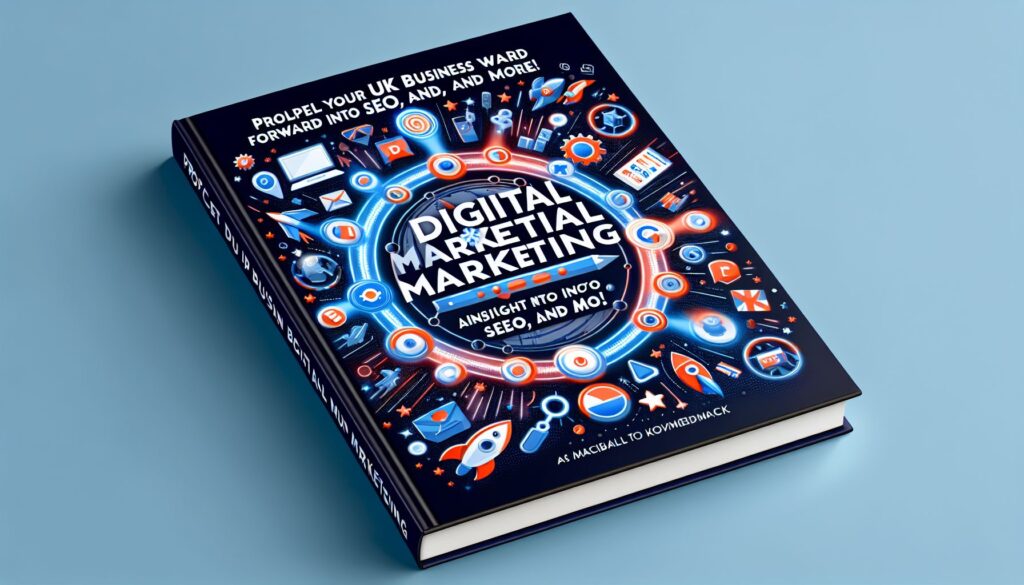Home
- Rising Above The Digital Din: A Comprehensive Primer on Digital Marketing, PPC & SEO for UK Businesses
 by Jeff Castillo
by Jeff CastilloIn this digital era, marketing isn’t just about catchy radio jingles or stunning billboards. It has coalesced into a more powerful, all-encompassing world that lies within the brilliance of screens – yes, we’re talking about digital marketing. In this interconnected world, drawing potential customers towards your business has become easier with digital marketing tools like Pay-Per-Click (PPC) advertising & Search Engine Optimisation (SEO). Being clear on these fundamental concepts can immensely help businesses based in the UK, and globally, to optimise their online presence and revenue.
The Fabric of Digital Marketing
Digital Marketing is a huge umbrella under which a plethora of strategies lie. From content marketing and social media networking, to email marketing and affiliate programs, the list is bound to change and expand as technology evolves. However, two of the most effective strategies that have been steadily thriving are PPC and SEO. Let’s have a closer look at these.
PPC – Pay to Be in the Spotlight
Imagine being able to place your advertisement right in front of a prospective customer who is actively seeking the products or services you offer. PPC does precisely that, you pay a fee each time your ad is clicked by search engine users.
Why is PPC Important?
In a word: visibility. Despite having an attractive website and top-quality products or services, you might not get a decent amount of site visits without the right exposure. This is where PPC comes in, particularly Google Ads. Google is the largest and most popular search engine in the UK, with a whopping 87% market share. A well-planned PPC campaign using Google Ads can get you to the top of the search results page faster than you can say ‘digital marketing’.
How to Create an Effective PPC Campaign
Successful PPC campaigns involve good planning, sound knowledge of Google Ads, consistent tracking and, of course, the right budget. Here’s a basic breakdown of the steps involved:
- Understand your target customers
- Research and select the right keywords
- Group those keywords into campaigns and ad groups
- Set up PPC landing pages
- Track and refine your PPC campaign as needed
SEO – Play The Long Game
Where PPC can get you instant visibility, SEO is about strategically elevating your website in the search engine’s unpaid results, or ‘organic’ search results.
Why is SEO Critical?
While PPC sees you paying for every click to your site, SEO traffic is entirely free. This is crucial for smaller businesses and start-ups that have limited marketing budgets. Furthermore, studies have shown that organic Search Engine Results Pages (SERPs) generate 20 times the traffic of paid SERPs.
SEO Strategies for your Business
- Optimize for Mobile: With mobile searches surpassing desktop in the UK, ensuring your website is mobile-friendly is vital.
- Local SEO: Nearly a third of mobile searches are location-based queries. Detailed business information in business directories and geographically targeted keywords can improve your local SEO.
- Great Content: Regular production of engaging, informative content that uses your defined keywords can greatly improve rankings.
In Conclusion
The digital landscape is ever-evolving and keeping up can be challenging. However, a deep understanding and effective application of digital marketing, particularly PPC and SEO, can make the ride smoother for your business. By mastering SEO, your website could become the gift that keeps on giving, bringing in steady, free traffic. Meanwhile, PPC could be the power boost you need, shooting you to the top of search results in an instant. Used symbiotically, they could be the perfect tools to make your business flourish in this digital era.
With the right plan and strategy, digital marketing, PPC, and SEO can significantly help businesses to promote their products/services and eventually, increased their profitability scale. Remember, it’s a marathon, not a sprint – so keep refining your strategies and stay on top of trends, and you’ll be sure to see success.
If you’d ever find yourself needing professional advice on creating effective digital marketing strategies tailored for your business, feel free to reach out to those renowned for their expertise in the field. Your business’s success lies at the other end of a well strategised PPC and SEO campaign!
- Thriving in the Digital Landscape: A comprehensive guide to Digital Marketing, PPC, SEO, and Business Promotion for UK Businesses
 by Jeff Castillo
by Jeff CastilloMaking the most out of digital marketing channels is more of a necessity than a choice for businesses worldwide. Amid this trend, companies in the UK are always on the hunt for effective ways to streamline their online presence and attract their target audience. In this article, we will explore how Digital Marketing, PPC (Pay Per Click), SEO (Search Engine Optimization) can significantly enhance your UK business’ outreach and market penetration.
An Introduction to the Digital Marketing Realm
Digital marketing presents an arena which, if utilised appropriately, can significantly enhance brand visibility while ensuring efficient cost management. It incorporates various subsets such as SEO, PPC, content marketing, social media marketing, and email marketing, providing a whole range of opportunities for businesses to connect with their audiences.
In the UK, where about 95% of the population are internet users, digital marketing becomes even more significant. Businesses do not only aim to establish a robust online presence but also to top the search result pages and reach their consumers more effectively.
Cracking the Code of SEO
SEO or Search Engine Optimization is a major player in the digital marketing landscape. It’s a method of increasing website visibility for relevant searches. The better your pages’ SEO, the more likely it will attract users from search engines.
This is fundamental in markets like the UK, where most internet users turn to search engines to guide their purchasing decisions. Effective SEO strategies involve optimising your website’s design and content to make it attractive, relevant, and easy to find by search engines. This is achieved through keyword targeting, meta-tag optimization, high-quality content creation, amongst other techniques.
The Magic of PPC
Pay Per Click (PPC) is a model of internet marketing in which advertisers pay a fee each time one of their ads is clicked. These ‘sponsored ads’ feature prominently on the search engine results pages (SERPs) and can provide an immediate online presence.
Google Adwords is a prominent platform used for PPC advertising. It allows businesses to set a budget for advertising and only pay when people click the ads. This method is particularly beneficial for the UK market where competition is high, and swift brand visibility is a major goal.
Efficacy of Digital Marketing – An Assurance
Digital Marketing has proven time and again its effectiveness over traditional marketing in terms of reaching a broader audience at lesser costs. Targeting specific demographics is more refined, and measuring the effect of the various strategies in use is easier and more precise.
In the UK’s dynamic and highly populated digital landscape, distinguishing your brand can be challenging. However, utilising SEO and PPC in conjunction with other cutting-edge digital marketing techniques can change the game.
Conclusion
The business landscape is continually evolving, and the digital marketplace has never been more crucial in this post-pandemic era. For your UK business to thrive, understanding and implementing effective digital marketing strategies is vital.
Remember, SEO helps you boost organic growth and site visibility over time, while PPC provides immediate results and offers quick entry to market. A well-rounded approach that combines these two powerful tools can turn out to be a game-changer.
The UK’s digital audience awaits, and harnessing the power of Digital Marketing, PPC and SEO to reach them effectively is your pathway to success. Welcome to the era of digitisation, where the globe is your marketplace, and every click can be a potential sale! With the right strategies, your business will not just survive, but thrive in this exhilarating digital age.
- Propel Your UK Business Forward with Digital Marketing: An Insight into PPC, SEO, and More!
 by Jeff Castillo
by Jeff CastilloUnderstanding the evolving digital marketing landscape and tapping into the multitude of marketing opportunities is a must for businesses craving success amidst tough competition. Here, we’re going to delve into the world of Pay-per-click (PPC), Search Engine Optimization (SEO), and the best ways to leverage these processes when promoting business to a UK audience.
Introduction
The ascendant growth of digital marketing is transforming the way businesses operate, revitalizing market competitiveness, and redefining the rules of user engagement. This paradigm shift calls for leveraging the plethora of opportunities these digital tools provide. PPC and SEO, being profound digital marketing strategies, aids businesses to produce sought-after visibility, draw increased web traffic, and boost customer conversion rate.
The Nuts and Bolts of SEO
SEO refers to visibility-boosting strategies that increase your website’s appeal to search engines. Put simply, the easier it is for search engines like Google and Bing to crawl through your website, the more likely it is to appear on the results page when users look for services or products similar to yours.
Enriching website content with relevant keywords, using backlinks, fixing page loading speeds, and optimising images are just a few basic aspects of SEO. Efforts in SEO breathe life into your website’s online presence, filling your potential customer’s search results with your brand.
While SEO techniques may not yield instantaneous results, they undoubtedly provide evergreen traffic that withstands leaps and bounds in the rapidly changing online dimension. A well-implemented SEO strategy is a gift that keeps giving – ensuring continuous and organic traffic drawn from search engines.
Understanding PPC
While SEO focuses on organic traffic, PPC is all about paid traffic. As the name proposes, Pay-per-click means that you only pay whenever someone clicks on your ad. These ads often appear atop the organic listings on the search engine results page.
There are various platforms where you can deploy PPC ads but particularly popular platforms include Google Ads and Bing Ads. You can select the keywords for which you want your ads to appear, set a budget, and then only pay when a user clicks on your ad. This strategic approach allows businesses to reach prospects who are already seeking their products or services – a targeted reach.
While budgets and cost-per-click can vary vastly, PPC’s primary advantage is its ability to produce immediate results. If you’re looking for quick traffic and you’ve got the budget to back it up, PPC could be right for you.
Promoting Your UK Business Digitally
-
Optimize your website for UK-based searches: When implementing your SEO strategy, consider using keywords that are oriented towards a UK audience. For PPC, target ads towards the UK market. Similarly, ensure your website is mobile-friendly as most UK users access the internet through their smartphones.
-
Leverage UK-specific platforms: In addition to general social media platforms, consider utilizing UK-specific platforms. Sites like Gumtree or platforms like BBC can provide new avenues for reaching your target audience.
-
Market to UK Audience Preferences: Find out what your UK audience prefers and tailor your offerings accordingly. For instance, UK audiences value sustainability, so highlighting eco-friendly practices might draw in more consumers.
-
Time your Ads: Scheduling your ads to run during peak UK hours can give you a better chance of catching your audience when they’re active.
Conclusion
In today’s digital-driven world, missing out on the benefits of PPC, SEO, and digital marketing at large can be a critical faux pas for businesses. Tailoring your digital marketing strategy to your UK audience will not just bring in the numbers, but it’ll create a loyal audience who appreciates your understanding and efforts.
Remember, digital marketing isn’t just about putting your brand on the web: It’s about making your brand a part of every potential customer’s online experience. A blend of well-deployed SEO and PPC strategies is a sure-shot way of gaining this omnipresence in your audience’s online world.
Ultimately, the key to winning this digital marathon is patience, consistency, creativity, and a willingness for continuous learning – so start striding! With the right approach, you can watch your UK business prosper in the world of digital marketing.
-
- Digital Marketing in the UK: A Comprehensive Guide to PPC, SEO, and Business Promotion
 by Jeff Castillo
by Jeff CastilloFor countless businesses in the world, the shifting sands of marketing have led them to digital shores. Traditional advertising methods are now augmented, if not outright replaced, with online strategies such as Pay Per Click (PPC) advertising and Search Engine Optimisation (SEO). For businesses within the United Kingdom looking to promote their goods and services, understanding these strategies is crucial. In this post, we’ll demystify digital marketing, PPC, SEO, and how they can be used to hawk your wares effectively.
What is Digital Marketing?
In essence, digital marketing refers to the promotion of businesses, products, or services via online channels. This ranges from websites, social media, email, apps, and search engines. It’s a vast system that allows companies to reach out to customers in a fast, personal, and effective manner.
Digital marketing techniques come in many flavours and, depending on your business, some may be more suitable than others. Whether it’s content marketing, email marketing, social media marketing, mobile marketing, or the ones we’re focusing on – PPC and SEO – the prime goal remains the same: to reach, engage, and convert your audience effectively.
Let’s Talk PPC
‘Pay Per Click’ isn’t some new-age business mantra, but it is a powerful tool in the online marketer’s toolkit. As the name suggests, PPC involves the advertiser paying each time a user clicks on one of their online ads.
PPC ads appear when people use search engines like Google to find something. They’re usually similar to the query entered by the user, offering a shrewd way to show potential customers your relevant ads.
Remember though, you pay for each click, so a solid PPC strategy is necessary to ensure you’re not just getting clicks, but getting clicks that result in conversions. This involves deep knowledge of keyword analytics, understanding your target audience, and, of course, creating compelling ads.
Breaking Down SEO
If PPC is sprinting out the gate to reach customers quickly, Search Engine Optimisation (SEO) is the marathon runner, tirelessly working to build visibility over time. SEO involves making structural changes to your website and creating content that boosts your site’s visibility in search engine results pages (SERPs).
SEO is a complex beast as search engines use algorithms to rank sites. Factors like mobile-friendliness, site speed, and domain authority can help or hinder your visibility. In terms of keywords, unlike PPC, SEO focuses on ranking for long-tail keywords – longer phrases that, whilst less common, can yield high conversion rates as they’re exact matches for a user’s query.
Mastering SEO takes time and effort, but the reward of organic (non-paid) traffic over time can be a huge boon for your business.
Tie it Together
Just understanding PPC and SEO isn’t enough; for peak visibility online, you should marry these strategies together. Building a comprehensive digital marketing plan involving both PPC and SEO can consolidate your strengths and counteract weaknesses. It’s like a double-layered safety net, ensuring that you reach your target audience with surgical precision.
Remember, though, like any plan, it should be fluid enough to adapt to changing situations. Both PPC and SEO rely on keywords, but they should not compete. Instead, share keyword data across both strategies for a well-rounded marketing plan.
Conclusion
The digital world offers numerous methods to promote your business in the UK. PPC provides an instant method to gain visibility for your products or services while SEO helps you build a sustained, long-term online presence.
Using these strategies wisely and in unison can help you tap into vast online marketplaces and bring your products and services to a wider audience. As you embrace the world of digital marketing, remember to adapt and refine your strategies as trends and markets change. Happy marketing!
By understanding and implementing digital marketing, PPC, and SEO, your business can ride the wave of the internet and reach customers in ways you never thought possible. So, why not take the plunge and dive into the world of digital marketing?
It’s time to take your business to the next level. With the right strategy, you’ll be standing tall on the digital marketing podium.
- Unleashing the Potentials of Digital Marketing, PPC and SEO for Your UK Based Business
 by Jeff Castillo
by Jeff CastilloHello and welcome to a comprehensive guide to utilising digital marketing strategies, such as Pay-Per-Click (PPC) and Search Engine Optimisation (SEO), to enhance your business growth in the United Kingdom.
INTRODUCTION
In recent years, digital marketing has grown from a novel strategy to an essential tool in the competitive business world. Nowadays, for businesses hoping to reach their objectives, utilising a savvy digital marketing strategy isn’t just an edge– it’s a necessity. In an increasingly digital age, businesses lacking a digital presence can gradually lose the game.
But what exactly is digital marketing? How do PPC and SEO fit into the mix, and how can they help promote your UK-based business? This article seeks to answer these questions and shed light on how you can leverage these strategies to yield profitable outputs in the UK market.
THE DIGITAL MARKETING LANDSCAPE
Digital marketing refers to advertising delivered through digital channels such as search engines, social media, email, or websites. It, therefore, involves all marketing efforts that utilise an electronic device or the internet.
Now, why is digital marketing a massive deal for businesses in the UK? The answer is simple: the internet’s pervasiveness has intertwined almost all aspects of British people’s lives, thereby making the digital landscape an excellent platform for brands to reach and connect with potential customers. According to the latest statistics, an impressive 96% of the British population uses the Internet, and about 45 million people are active social media users.
As you can see, we are talking about a massive pool of potential customers. However, digital marketing isn’t a one-size-fits-all approach. To make the most out of your digital marketing strategy, leveraging specific digital marketing strategies like PPC and SEO should be on your radar.
PPC – PAY PER CLICK
Pay-Per-Click (PPC) is a method of driving traffic to your website by paying a publisher every time your ad gets clicked. Typically, Google Ads is the most common PPC advertising system in the world, but other PPC campaigns include Facebook Ads, Twitter Ads, LinkedIn Ads, Bing Ads, among others.
PPC campaigns can help your business reach potential customers quickly, which can sometimes be a time-consuming process with other digital marketing strategies. You can also track your PPC campaign giving you real-time data on performance, and making that allows you to adjust your campaigns for maximum results.
SEO – SEARCH ENGINE OPTIMIZATION
Unlike PPC where you pay to get visits to your website, SEO focuses on earning visits organically. Search Engine Optimisation (SEO) is all about tweaking your online content so that a search engine such as Google or Bing is more likely to show it as a top result for searches of a certain keyword or phrase.
For instance, if you are running a London-based cupcake business, you would likely want your business to appear in Google results when someone searches for “best cupcakes in London”.
While SEO requires time and effort, it offers a long-term growth strategy and creates an avenue for free organic traffic.
CONCLUSION
In conclusion, digital marketing, PPC, and SEO are essential marketing tools for any UK-based business hoping to reach today’s Internet-savvy consumer. PPC campaigns provide a quick way to boost your visibility, while a strong SEO strategy can significantly enhance your brand’s long-term online presence. Both components should be integral parts of your overall digital strategy to promote your business effectively in the UK market.
Remember, the purpose is to reach and connect with your target audience at the right time and place. So, why not maximise your reach within the UK digital landscape with these proven strategies?